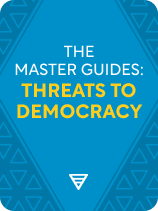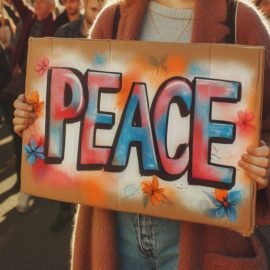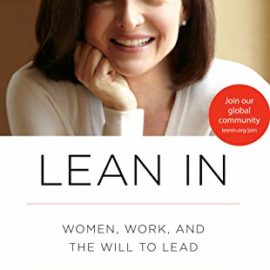

This article is an excerpt from the Shortform book guide to "The Master Guides: Threats to Democracy" by Shortform. Shortform has the world's best summaries and analyses of books you should be reading.
Like this article? Sign up for a free trial here.
What are the greatest threats to democracy today? How do healthy democratic states descend into illiberalism and authoritarian rule?
Three significant factors that can erode public trust in democratic systems: extreme polarization, the decline of democratic norms, and wealth inequality. Each of these threats poses unique challenges to the stability and effectiveness of democratic governments.
Read more to explore how these threats impact our democratic institutions.
Threats to Democracy
The survival of democracies is based on public confidence—governments derive their legitimacy and authority from the consent of the governed. When citizens trust government institutions, they’re more likely to participate in the democratic process, adhere to the rule of law, and accept the outcomes of elections and governmental decisions, thus ensuring the stability and effectiveness of the democratic system.
Therefore, a loss of public trust in a democratic system can be fatal to the system’s survival. We’ll explore three main threats to democracy that, either on their own or in combination, can cause the public to lose that trust:
- Extreme polarization
- The decline of democratic norms
- Wealth inequality
Democratic Threat #1: Extreme Polarization
In Why We’re Polarized, author Ezra Klein outlines the case for why extreme political polarization represents a grave threat to functioning democracies.
Klein writes that extreme polarization transforms ordinary politics into a winner-take-all contest between diametrically opposed political parties. The dynamics of polarization, he warns, create a positive feedback loop: Partisan voters feel increasingly hostile toward one another and reward politicians who deliberately antagonize the other side, driving further rounds of polarization. This cycle of ever-escalating hostility between political parties makes it impossible for either side to engage in political compromise and power-sharing—both of which are necessary to the survival of a democratic system.
Klein observes three key drivers of this polarization dynamic:
- The supremacy of identities over issues
- The pull of negativity
- Unwillingness to compromise
1) Identities Over Issues
The first driver of polarization Klein observes is the supremacy of identities over issues. He writes that in political systems characterized by extreme polarization, partisan differences stem less from disagreements about what we believe and more from who we are and who we believe our opponents to be.
He writes that in such dysfunctional systems, political disagreements run far deeper than straightforward economic questions like “Will this bill help improve the roads in my town?” or “Which candidate or party will help lower the cost of prescription drugs?” Instead, partisanship operates at a more fundamental, tribal level: We support the party that we believe represents people like “us” and that will help us defeat and punish the hated “others.”
In Strangers in Their Own Land, Arlie Hochschild further explores the identities-over-issues dynamic raised by Klein. Specifically, she analyzes the political identities of conservative Louisiana voters who keep electing right-wing politicians who allow oil companies to poison their air and drinking water, expose them to lethal chemicals, and wreak havoc on their state’s budget and social services. Hochschild observes, just as Klein does, that these voting patterns really represent an expression of group identity on the part of these voters more than a preference for a particular set of policies. These voters wish to uphold their honor, dignity, and perceived rightful place in the social hierarchy.
For these voters, the Democratic Party offends their sense of honor by looking down upon people like them as racist, sexist, Bible-thumping, bigoted reactionaries. On the other hand, they see the Republican Party as standing as a better representative and defender of their values.
In his autobiography, A Promised Land, former president Barack Obama observes a similar dynamic to that noted by Klein and Hochschild. Shortly after first taking office in the Illinois State Senate in 1997, Obama observed that political, racial, and ethnic divisions were making it impossible for politicians to address real challenges. Divided into districts, each with their own local interests, legislators lacked the political freedom of action to work on legislation that would serve the common good; instead, they found it more politically expedient to focus on the interests of their particular districts. This was what made the political landscape inherently oppositional and dysfunctional.
2) The Pull of Negative Polarization
Identity-based politics fuel a second dynamic that drives polarization: a specific variant that political scientists call negative polarization. Klein writes that negative polarization transforms political competition into an all-or-nothing, us vs. them struggle —we hate and fear the other political coalition more than we love and admire our own. Putting it in the American context, many Democratic Party voters aren’t Democrats because they have deep love and admiration for the Democratic Party and its values. Instead, they have an abiding fear of and hatred toward the Republican Party, and they view the Democrats as their only bulwark against that party.
3) Unwillingness to Compromise
The third driver of polarization Klein discusses is an unwillingness to compromise: Extreme partisanship under conditions of extreme polarization makes political compromise all but impossible. After all, you can’t compromise or accept the normal give-and-take of democratic governance (like losing elections), because to do so would risk letting the hated other side “win.” And when you fear and despise your partisan rivals, believing they want to destroy everything you cherish—instead of merely being a group that you disagree with—you’ll inevitably come to see every election as an ultra-high-stakes contest.
Ultimately, writes Klein, both sides develop a mentality of winning at all costs—because the other side is simply too radical, dangerous, and different to be trusted with power. Once this mentality is in place, both sides only drift further and further away from each other—widening the gulf between the parties and further fueling the descent into extreme polarization.
Democratic Threat #2: Decline of Democratic Norms
In the previous section, we explored extreme polarization as the first threat to democratic institutions. In this section, we’ll examine the second of these threats: the decline and ultimate abandonment of democratic norms.
In How Democracies Die, authors Steven Levitsky and Daniel Ziblatt write that political norms—the unwritten rules that govern political conduct—provide the best protection for democracy by establishing a broadly accepted standard of what is and isn’t acceptable behavior.
The authors write that it’s useful to think of norms as the guardrails that prevent political competition from getting too intense or the stakes of elections from getting too high and turning every election into a winner-take-all, win-at-all-costs battle. In a healthy democratic system, politicians respect norms by not engaging in acts of extreme aggression against their opponents—even if such conduct would technically be legal.
Levitsky and Ziblatt identify mutual toleration and institutional forbearance as two norms that act as strong linchpins for democracy—and explain why the withering of either one can signal democracy’s demise.
1) Mutual Toleration
The first norm Levistsky and Ziblatt identify is mutual toleration. Mutual toleration means accepting the legitimacy of one’s political opponents and acknowledging their right to govern, as long as they win in free and fair elections—regardless of ideological differences. Without mutual toleration, warn Levitsky and Ziblatt, opponents may feel that they’re justified in taking extraordinary steps to keep their enemies from attaining power.
Zimbabwe in the early 2000s provides an example of what can happen when political actors abandon mutual toleration. In 2000, the political landscape in Zimbabwe became increasingly contentious, particularly between President Robert Mugabe’s ruling ZANU-PF party and the opposition Movement for Democratic Change (MDC) led by Morgan Tsvangirai. The elections during this period were marred by allegations of electoral fraud, violence, and intimidation.
The refusal by President Mugabe and his party to accept the legitimacy of the opposition, coupled with accusations of election rigging, eroded mutual toleration. The disputed elections and the contentious political environment led to a series of extraordinary steps, including the violent suppression of political dissent—culminating in the arrest of opposition leaders, including Tsvangirai.
2) Institutional Forbearance
The second norm Levitsky and Ziblatt identify is institutional forbearance. Institutional forbearance is the unwritten rule that political actors will not weaponize their control of institutions to marginalize opponents or hamper effective day-to-day democratic governance—even if such behavior is technically legal.
One example of the dangerous tit-for-tat cycle that can befall a democratic system when politicians abandon institutional forbearance comes from Texas. In 2003, the Republican-dominated state legislature redrew the boundaries of Texas’s state legislative and congressional districts to maximize partisan advantage for the Republicans at the state and federal levels. While state legislatures do have the right to redraw political boundaries, they usually do so immediately following the decennial census. The timing of the 2003 redistricting was highly unusual in that it occurred out of cycle, between the 2000 and 2010 censuses.
In response to this episode of norm-breaking, Democrats in the state legislature responded with their own violation of political norms—by literally fleeing the state to deny the majority Republicans a quorum in the legislature and prevent a vote on the redistricting plan from taking place.
Democratic Threat #3: Extreme Wealth Inequality
A third threat to democracy can come in the form of extreme and growing wealth inequality, which blunts opportunities for social mobility and exacerbates social divisions.
1) Growing Social Divisions
Growing social divisions are the first way that inequality can threaten democracy. Writing in What Money Can’t Buy, philosopher Michael Sandel warns of the social consequences of inequality. He argues that the financial gap between the affluent and the poor leads to social divisions that cause these groups to share fewer and fewer common spaces and experiences.
He cautions that such a development is very dangerous for a democratic society, in which all citizens are supposed to be equal and share a common stake in the community’s welfare. When society’s wealthiest members lead vastly different lives from everyone else (and, because of their wealth, wield much greater political power than everyone else), those bonds of commonality get weaker.
In this scenario, the richest citizens feel that they have little stake in the welfare of their fellow citizens—they have enough money to never have to worry about underperforming schools, crumbling infrastructure, or an antiquated healthcare system. Meanwhile, the poorest citizens feel alienated from the common civic project if they feel that the political and economic system has turned its back on them.
2) Reduced Social Mobility
The second threat inequality poses to democracy comes in the form of reduced social mobility. In Capital in the Twenty-First Century, author and economist Thomas Piketty writes that the 21st century may mark the return of an economic and social structure era dominated by wealthy heirs and heiresses. In this stagnant and low-growth type of society, old wealth passed down from generation to generation counts for a much larger share of total wealth than that earned by people during their lifetimes.
He warns that such a society offers few opportunities for upward social mobility. Like Sandel, he argues that wealth inequality could lead to the mass rejection of the very idea of a social state and a democratic society that has certain basic obligations to all its citizens.

———End of Preview———
Like what you just read? Read the rest of the world's best book summary and analysis of Shortform's "The Master Guides: Threats to Democracy" at Shortform.
Here's what you'll find in our full The Master Guides: Threats to Democracy summary:
- What the survival of democracy depends on
- The threats to democracy we should look out for
- How to fight back against democratic decline






